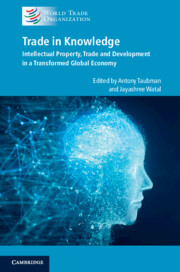Book contents
- Frontmatter
- Contents
- Figures
- Tables
- Contributors
- Preface
- 1 Thematic Overview: Charting the Evolution of Knowledge Flows
- Part I Conceptual Framework
- Part II Measuring Trade in Knowledge
- Part III Impact of Knowledge Flows on Trade and Development
- Part IV Policy, Regulatory and Legislative Frameworks
- Part V Looking Forward
- Index
15 - Knowledge Spillovers through International Supply Chains
from Part III - Impact of Knowledge Flows on Trade and Development
Published online by Cambridge University Press: 17 February 2022
- Frontmatter
- Contents
- Figures
- Tables
- Contributors
- Preface
- 1 Thematic Overview: Charting the Evolution of Knowledge Flows
- Part I Conceptual Framework
- Part II Measuring Trade in Knowledge
- Part III Impact of Knowledge Flows on Trade and Development
- Part IV Policy, Regulatory and Legislative Frameworks
- Part V Looking Forward
- Index
Summary
Patents and scientific publications are a public source of codified knowledge. To benefit from this knowledge in their research and development, firms often need to have access also to its non-codifiable part that diffuses only via face-to-face communication and direct transfer. This chapter shows that international supply chains can facilitate access to foreign non-codified knowledge and thus provide a boost to innovation through international knowledge spillovers. Using industry-level R&D and patent data for a sample of 29 countries for the period 2000–2008, we estimate the importance of knowledge that is diffused and absorbed thanks to international production linkages. We show that production linkages are especially conducive to knowledge spillovers when firms in the knowledge-receiving country are both sourcing from and selling to the international supply chain. In addition, we find that not only countries at the technology frontier, but also middle-income countries can benefit from research spending abroad. Finally, our results suggest that knowledge diffusion has become less localized as international supply chains have become more global.
- Type
- Chapter
- Information
- Trade in KnowledgeIntellectual Property, Trade and Development in a Transformed Global Economy, pp. 453 - 470Publisher: Cambridge University PressPrint publication year: 2022
- 1
- Cited by

